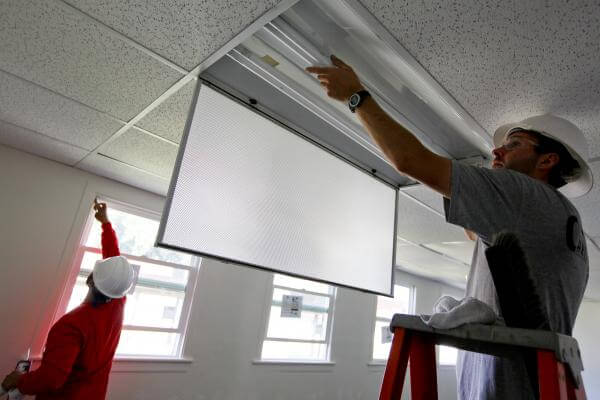UK-wide Intelligent Community Challenge launches to shine a light on UK Design Talent and Role in design of Future Cities.
The #urbandesignhackathon officially launched the nationwide Intelligent Community Challenge at Ravensbourne College on the Greenwich Peninsula, London, on Saturday, October 3. The ICC which has been funded by multinational digital industrial company, GE (General Electric), is inviting immediate applications from the crème of UK students from the fields of architecture, design, engineering and computer science to generate innovative solutions to council regeneration challenges, using intelligent LED lighting as part of their solutions to reinvigorate urban spaces. Time is of the essence – students must submit applications to [email protected] by November 14. An independent panel of judges will select the winner and runner-up to be announced at an Awards Ceremony on November 20.
Spearheaded by founding sponsor GE Lighting, the competition seeks to bring local authorities and universities together, looking for innovative new ideas and collaborations that will improve urban areas. The winning prize will be a ten day global learning tour of GE Lighting’s new Software Centre of Excellence in San Ramon, California. The runner-up is offered work experience with Citi Logik, the UK mobile analytics company that helps councils make sense of cities.
Armin Mayer, Marketing Manager GE Lighting EMEA, commented: ‘Today is only the beginning of an exciting journey to transform existing lighting infrastructure into something truly great, truly intelligent. We invite and challenge students to play a key role in this journey, by helping cities and communities in the UK to design the intelligent lighting systems of the future.’
The Intelligent Community Challenge, backed by London Councils and Urban Design London, hosted by Transport for London, invites students to submit design proposals for projects from across the UK including London (Bromley, Camden, Enfield, Royal Borough of Greenwich and others), Glasgow, Birmingham, Coventry, Peterborough.
At the #urbandesignhackathon launch, a host of distinguished expert speakers and panellists spoke to an invited audience of students, academics, technology and business leaders, council representatives, urban planners, press and media about how technology, including innovative LED-technology can help shape our future cities.
Zoltan Koltai GE’s Lighting EMEA Technology Director, EMEA said: ‘We are looking for ideas to help us identify how future cities can become more intelligent using lighting technology. Our mission is to find students who understand the challenges of urban design and can translate this into a technical solution with their specific knowledge, capabilities and skills.’
Gerard Grech, CEO of Tech City UK says ‘people need a say in cities’ digital transformation. This huge digital transformation needs to have applications useful for people. London is a digital platform and people should have a say on how that city is shaped around them. I’m calling for a digital social contract in which people have collective responsibility as to how data is used.’
The design competition aims to find top students with the creative vision to turn their design talent into potential LED-lighting led solutions to real urban challenges. Councils across the UK have submitted briefs to the Community Challenge on crowd-funding website www.Spacehive.com.
Associate dean and head of architecture at Ravensbourne, Layton Reid has incorporated the competition into the college curriculum. He said: ‘We have responsibility to fulfil people’s needs and aspirations to assist in choice. Smart cities are about leveraging choice.’ Ravensbourne architecture student Hasan Jamshed said he was submitting some fresh and innovative ideas into the competition and spoke highly of the ‘inspiring and unique’ teaching environment at the college.
Dr Daniel Magazzeni, Artificial Intelligence expert and Lecturer in Computer Science at Kings College London, said: ‘It is time to focus on the word ‘cities’, not ‘smart’ cities. In the synergy between the virtual and physical world people can connect wherever they are so the next step is the Internet for things to transmit information.’
Bromley Council’s transport and major projects manager Chris Cole, has received £100,000 from TFL’s Incubator Fund to solve the area’s traffic problems and is thinking about dynamic road markings generated through light! He said: ‘I need technical advice and innovative thinking from the student with the right expertise for my project, to use light instead of paint for road markings. So if I detected that traffic would be very dense, I could create additional road capacity anytime simply by changing the road markings and without expensive road building. I can figure out safety as a transport planner but need help to make the lighting work in a cost-effective and practical way.’ Alexander Baldwin-Smith Graduate Transport Planner added: ‘If we could change markings, a company could reserve a loading bay, say for 30 minutes, which then merges into the road again. Likewise with emergency service vehicles. But we need to get the technological aspect right to begin with.’
LED lighting has ramifications far beyond just lighting – lamp-posts, fitted with Wi-Fi and sensor technology connect cities and enable smart urban services and communications with the people who live in cities, e.g. directing drivers to free parking spaces, through direct communication with their smartphones, yielding differing levels of light as required by traffic flows, and enabling personalized communications, in addition to being more energy-efficient.
Jodie Eastwood is programme manager at the Knowledge Quarter in Kings Cross, launched December 2014 by Chancellor George Osbourne. Knowledge Quarter has 57 organisations within a mile of King’s Cross, including Central St Martin’s, The Guardian, the Francis Crick Institute, Poet in the City and also Google coming soon. Jodie said: ‘Our Intelligent Community Challenge project is the Green Walking Route, a quiet pedestrian route linking St. Pancras with Euston, which could benefit from good lighting design. I am hoping students will come up with great ideas for that.’
John Lynch Project Organicity lead at Future Cities Catapult, commented: ‘OrganiCity offers the kind of platform, and support that can help students prototype smart services like those they may propose for the ICC. Events like this are amazing as they are an opportunity to create a mixing pot of different types of people. We have already seen examples of collaboration. I would like to say congratulations to all students entering this competition. You are pursuing a great goal.’































